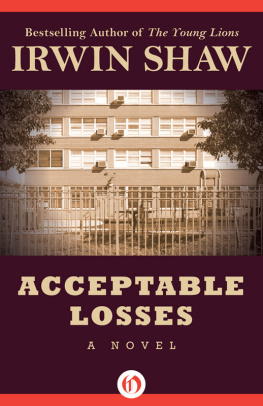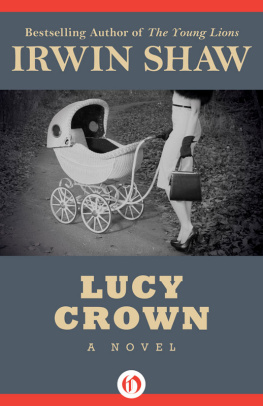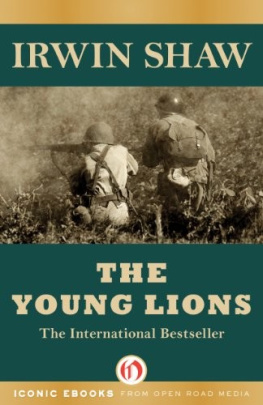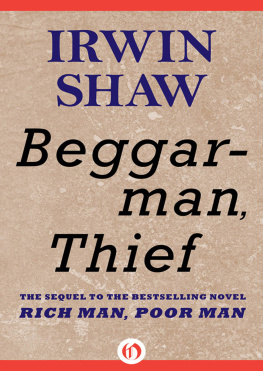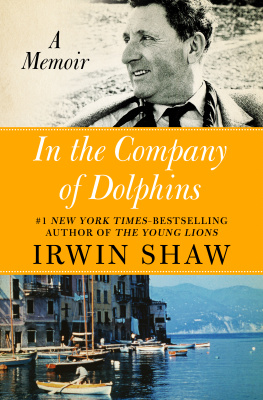Irwin Shaw - The Troubled Air
Here you can read online Irwin Shaw - The Troubled Air full text of the book (entire story) in english for free. Download pdf and epub, get meaning, cover and reviews about this ebook. year: 2013, publisher: Open Road Integrated Media, genre: Art. Description of the work, (preface) as well as reviews are available. Best literature library LitArk.com created for fans of good reading and offers a wide selection of genres:
Romance novel
Science fiction
Adventure
Detective
Science
History
Home and family
Prose
Art
Politics
Computer
Non-fiction
Religion
Business
Children
Humor
Choose a favorite category and find really read worthwhile books. Enjoy immersion in the world of imagination, feel the emotions of the characters or learn something new for yourself, make an fascinating discovery.

- Book:The Troubled Air
- Author:
- Publisher:Open Road Integrated Media
- Genre:
- Year:2013
- Rating:5 / 5
- Favourites:Add to favourites
- Your mark:
- 100
- 1
- 2
- 3
- 4
- 5
The Troubled Air: summary, description and annotation
We offer to read an annotation, description, summary or preface (depends on what the author of the book "The Troubled Air" wrote himself). If you haven't found the necessary information about the book — write in the comments, we will try to find it.
The Troubled Air — read online for free the complete book (whole text) full work
Below is the text of the book, divided by pages. System saving the place of the last page read, allows you to conveniently read the book "The Troubled Air" online for free, without having to search again every time where you left off. Put a bookmark, and you can go to the page where you finished reading at any time.
Font size:
Interval:
Bookmark:

To Martin
Bought by Maraya21
kickass.so / 1337x.to / h33t.to / thepiratebay.se
THE CLOCK ON THE ACOUSTICALLY PERFECT WALL MOVED TOWARD nine-thirty, nibbling at Thursday night. The scarred Negro in the cashmere jacket peered through his glasses at the pages in his hand and drawled a line that had seemed funny to everyone in the studio at rehearsal. Fifteen million people laughed. Or were supposed to laugh. Or perhaps didnt laugh. There would be repercussions from this later in the year.
In the control room, Clement Archer, behind the sound-proof glass, waved his arm to indicate that time was running out. Loyally, on the floor in front of the microphone, the next actor, Victor Herres, spoke a little more quickly than usual and bit crisply into other peoples cues and the lost seconds were won back from the electric clock.
Momentarily victorious over Thursday, Archer leaned back in his chair and squinted at the actors on the other side of the glass. Eloquent fish in a clear aquarium, they swam on the element of time up to and away from the nourishment of the microphones, their voices and the sound of musical instruments from another room blended delicately by the ear-phoned engineer who sat at the control board next to Archer.
The music swelled slowly and the conductor was putting more trumpet into it than Pokorny, the composer, had wanted. Archer was certain that Pokorny, sitting behind him on the edge of a chair, would make a face at this point. He turned and looked. Pokorny was making a face. Pokorny never hid anything. The loose fat jowls, the little pale eyes behind the European glasses, the pink bow mouth immediately reflected every thought that passed through Pokornys head. Right now he was making a complicated face, in which he was trying to announce to the world that he was not responsible for the sounds that the butcher of a conductor was drawing from the orchestra, that American musicians were too loud, that he had warned everyone, had fought and as usual lost, because he was a foreigner.
Archer smiled and turned back to the program. He liked the music. He rubbed his bald head reflectively. He had lost his hair by the time he was twenty-five and in the process had developed a nervous habit of touching the top of his head, as though to confirm the bad news a dozen times an hour. The disaster was now twenty years in the past and confirmation was history, but the sorrowful investigating movement remained.
The music died down and the closing scene of the program swept smoothly toward the finish. Across the studio, in a small gallery behind another window, the sponsor and ONeill, the agency man, sat quietly. The sponsor had a dignified expression on his face. He didnt look happy, but he didnt look restless. I will settle for dignity, Archer thought, and listened to Herres making the long final speech.
The scene ended, the music swelled up, Pokorny made another, less complicated face, the announcer praised the product generously, but with decorum. The sponsor looked dignified; the closing theme roared up and faded; the engineer twisted a dial. A pleasant silence filled the control room for a few seconds. Archer blinked and stood up as the actors in the studio broke away from the microphones and started to talk among themselves. Archer patted the engineers shoulder. You were lovely, Johnny, he said. Never, in many long years of listening, have I been so moved by an engineer. Such delicacy with the left hand, such virility with the strings, such control with the American Federation of Radio Artists.
Brewer, the engineer, grinned.
On the floor, Herres was looking up at Archer in the control room and invitingly lifting his hand as though he had a glass in it.
The actor is making a significant gesture, Archer said, nodding to Herres. Would you say that was beer or bourbon in his hand? He started out of the room, passing Barbante, who was still sitting slumped in his chair, tapping a cigarette on a heavy gold case. Barbante was the writer for the program and, as usual at these moments, he had a derisive and challenging look on his face. He was a small, thick man with a long dark head. He dressed like a diplomat and always exuded a musky smell of expensive toilet water. Archer liked to avoid Barbante after a show.
The script worked out very well, Archer said, sniffing the perfume distastefully. Didnt you think so, Dom?
Oh, I thought it was peachy, Barbante said. Just peachy. Sir Arthur Wing Pinero just twirled twice in his grave in envy.
All personnel, Archer said, staring down at Barbante, disliking him, are hereby advised that, as of this date, all scripts are to be scorned on the writers own time.
You asked me, amigo, Barbante said, smiling up, and I told you. I thought it was peachy. So sad, so funny, so brainless. I may ask for a raise next week.
Mr. Archer, Mr. Archer. It was Pokorny, struggling into a trench coat behind him. Archer recognized the warning wail of complaint in Pokornys voice and sighed as he turned to face him. Pokorny had on a long wool muffler and a stiff, reddish tweed suit with trousers that were too long for him. The trench coat was almost pink and was stained with grease over the round bulge of Pokornys stomach. With it, Pokorny wore a black velour hat, snapped down all around over his long, thin gray hair. Fully dressed, he looked as though he had been turned out by a demented governess who had an uncle who played in a military band. He came very close to Archer and grabbed his arm. Mr. Archer, in the most respectful terms, it is necessary to talk about the insolence of the conductor. He had a singing Viennese accent and he never blinked his eyes and Archer always had the feeling that he wanted to sit on your lap when he talked about his music.
I thought the score was fine, Manfred, Archer said mildly, being polite and using Pokornys full name because he knew Pokorny hated to be called Mannie.
Of course, it is probably not in my place to say, Pokorny gripped Archers sleeve more tightly. But I feel it is my duty to tell you that every value was one hundred percent wrong. Pokornys mouth quivered moistly. I merely put myself on record. The conductor refuses to talk to me, so I advise youit should be sharp, it should be hard like diamonds for the proper values. And what do we geta flood of sentimentality, a Niagara of whipped cream, a Rhine of molasses.
Archer smiled. Gently he withdrew his sleeve. I know, Manfred. Youre right. Ill do something about it for next week. Depend upon me.
Pokorny bowed. I am in your debt, he said formally. He picked up a brief case stuffed with musical notepaper, and went out. Talent, Archer thought, watching the retreating, righteous back, sometimes assumes alarming shapes.
He went through the door and into the studio. Barbante followed him, holding a soft black overcoat over his arm. Barbante strode purposefully over to Miss Wilson, who was the prettiest girl on the program and who had been with them for only a week. She was talking in a corner to a character woman, pretending not to be waiting for Barbante. That size, Archer thought with a flick of envy, that face, youd never think theyd wait so anxiously for him. Barbante, the fragrant bachelor. There must be something about him that only women can detect. At any distance up to a mile. And they do it on instruments when the visibility is bad. Archer watched the girls nervous, surrendering smile as Barbante came up to her, and turned away, feeling unpleasant.
Alice Weller approached him and he arranged his face. You had to be gentle with Alice because she was unlucky and because in the last two years she had suddenly lost her looks.
Font size:
Interval:
Bookmark:
Similar books «The Troubled Air»
Look at similar books to The Troubled Air. We have selected literature similar in name and meaning in the hope of providing readers with more options to find new, interesting, not yet read works.
Discussion, reviews of the book The Troubled Air and just readers' own opinions. Leave your comments, write what you think about the work, its meaning or the main characters. Specify what exactly you liked and what you didn't like, and why you think so.

